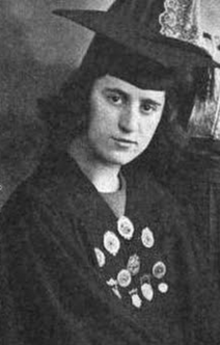Gertrude Weinstock
Gitta Gradova (1904 – April 26, 1985), also known as Gitta Cottle and Gertrude Weinstock, was an American pianist.

Early life
Gitta Gradova (birth name Gertrude Weinstock) was born in Chicago, the youngest child of Joseph and Sonya Weinstock. Her parents were both Russian Jewish immigrants to the United States; Gertrude was their only American-born child. Her father, Joseph Weinstock, was a rabbi by profession; both of her parents had been actors in Yiddish theatre when young.[1] Identified as a musical talent in childhood[2] she was already performing as a soloist in Chicago before her teens.[3][4] Her teacher in Chicago from age 7 was Esther Harris Dua.[5][6] Gradova was sent to New York at age 13, to study piano with Sergei Prokofiev.[7]
Career
At 19, Gitta Gradova performed with the New York Philharmonic Orchestra. She was a friend of Sergei Rachmaninoff and Vladimir Horowitz; Arturo Toscanini praised her work.[8] "Miss Gradova is a pianist whose own brilliancy, accuracy, and forcefulness become a transforming medium for what she plays," wrote a Chicago critic in 1931.[9] She toured in Europe in 1935,[10] and was featured at the Chicago's outdoor Ravinia Festival in 1938 and 1941.[11][12]
Although she retired from performing in 1942, she never stopped practicing daily at home; she taught piano, and played for guests and friends, according to her son. At the time of her death, she was planning a return to the concert stage, to play Rachmaninoff's First Piano Concerto with the Chicago Symphony under James Levine.[8]
Personal life
She married a doctor, Maurice Cottle. They lived in Chicago, raising their children in an affluent neighborhood. Their two children, Thomas and Judy; both earned PhDs and are loved and well respected in their communities and by their adoring families. Judy became a cabaret singer in New York.[13] Gitta Gradova died in 1985, aged 80, in Chicago.[1] Her son Thomas Cottle wrote a memoir about her, When the Music Stopped: Discovering my Mother (SUNY Press 2004).[14] Several recordings of her playing, including a private 1950 recording of Gradova and Horowitz playing a Mozart piano duet, are now available online.[15]
References
- "Gitta Cottle, 80, Concert Pianist" Chicago Tribune (April 28, 1985).
- "Music and Musicians" High School Life (February 1915): 345.
- "Recitals of Artistic Worth" Musical America (November 18, 1916): 16.
- "Gertrude Weinstock with Sinai Orchestra" Musical Courier (March 15, 1917): 33.
- "Brilliant Child Pianist to Play at Sinai Temple Concert" Music News (March 2, 1917): 14.
- C. E. W., "Gertrude Weinstock and her Teacher Esther Harris" Music News (October 8, 1920): 11.
- Howard Gardner, "Turning Away from the Spotlight" Boston.com (May 16, 2004).
- David J. Craig, "Mother-son Relationship Troubled by her Musical Genius" B. U. Bridge (January 30, 2004).
- Edward Moore, "Gitta Gradova Appears with Stock Orchestra" Chicago Daily Tribune (March 7, 1931): 19.
- Edward Barry, "Gitta Gradova Wins Acclaim at Symphony" Chicago Daily Tribune (February 4, 1936): 23.
- Edward Barry, "Gitta Gradova Triumphant as Ravinia Soloist" Chicago Daily Tribune (July 24, 1938): 19.
- Edward Barry, "Gitta Gradova Piano Soloist Thursday Night" Chicago Daily Tribune (July 3, 1941): d3.
- Bruce Webber, "Judy Kreston, Singer and Cabaret Owner, Is Dead at 76" New York Times (December 31, 2009).
- Thomas J. Cottle, When the Music Stopped: Discovering My Mother (SUNY Press 2004). ISBN 9780791485545
- "Watch: Horowitz and the Pianist Who Disappeared" Slipped Discs (July 18, 2017).
External links
- "A Mother's Musical Sacrifice" (2004), an interview with Thomas Cottle about his mother, from National Public Radio.